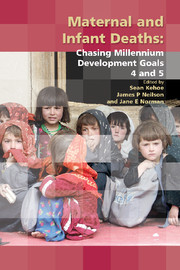Book contents
- Frontmatter
- Contents
- Participants
- Declaration of personal interests
- Preface
- The Millennium Development Goals
- SECTION 1 THE SIZE OF THE PROBLEM
- SECTION 2 CLINICAL PROBLEMS AND SOLUTIONS – MATERNAL
- SECTION 3 CLINICAL PROBLEMS AND SOLUTIONS – NEONATAL
- SECTION 4 TRAINING AND DEVELOPMENT
- SECTION 5 SPECIFIC CHALLENGES IN SPECIFIC COUNTRIES
- 17 Challenges faced in Afghanistan
- 18 Challenges faced in Zimbabwe
- 19 How Egypt has overcome the challenges
- 20 Learning from the achievements in Sri Lanka
- SECTION 6 CONSENSUS VIEWS
- Index
19 - How Egypt has overcome the challenges
from SECTION 5 - SPECIFIC CHALLENGES IN SPECIFIC COUNTRIES
Published online by Cambridge University Press: 05 February 2014
- Frontmatter
- Contents
- Participants
- Declaration of personal interests
- Preface
- The Millennium Development Goals
- SECTION 1 THE SIZE OF THE PROBLEM
- SECTION 2 CLINICAL PROBLEMS AND SOLUTIONS – MATERNAL
- SECTION 3 CLINICAL PROBLEMS AND SOLUTIONS – NEONATAL
- SECTION 4 TRAINING AND DEVELOPMENT
- SECTION 5 SPECIFIC CHALLENGES IN SPECIFIC COUNTRIES
- 17 Challenges faced in Afghanistan
- 18 Challenges faced in Zimbabwe
- 19 How Egypt has overcome the challenges
- 20 Learning from the achievements in Sri Lanka
- SECTION 6 CONSENSUS VIEWS
- Index
Summary
Introduction
Discussion of the Millennium Development Goal to improve maternal health (MDG5) is often pessimistic, yet some low-income countries are well under way to achieving this goal and have lowered maternal mortality. Egypt is one such case. Since 1992, maternal mortality has been reduced by 68%, and the absolute level of 55 per 100000 live births reported in 2008 is low by many standards, although it remains 5—10 times higher than those countries with the lowest mortality. This chapter addresses three questions:
□ Has maternal mortality in Egypt actually declined?
□ What else was happening at the same time?
□ What interventions and policies made these changes come about?
Has maternal mortality in Egypt actually declined?
Maternal mortality levels
Maternal mortality has declined in Egypt over the past 30 years (Table 19.1, Figure 19.1). Two comprehensive National Maternal Mortality Studies (NMMS) in 1992—93 and in 2000 showed a dramatic decline in the maternal mortality ratio (MMR) from 174 to 84 per 100000 live births. Although all methods are likely to miss some maternal deaths, the similar approach used in both of these studies means the degree of underestimation is probably similar. Subsequently, Egypt adopted a Maternal Mortality Surveillance System (MMSS) that has reported maternal mortality annually since 2002. Considerable effort seems to have gone into implementing the MMSS. For example, requests for free formula to feed infants whose mothers have died during delivery are collated centrally and checked against maternal deaths identified through the MMSS.
- Type
- Chapter
- Information
- Maternal and Infant DeathsChasing Millennium Development Goals 4 and 5, pp. 287 - 306Publisher: Cambridge University PressPrint publication year: 2010

